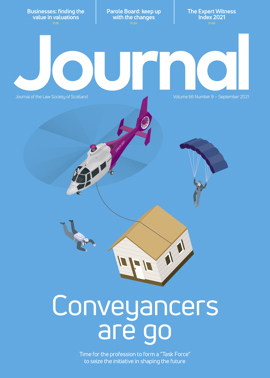Commissary: the top 10 failings
Advice from the Society on 10 things to watch out for to cut the return rate of applications for confirmation
The Society’s Trust & Succession Law Committee, and others, have been engaging with Scottish Courts & Tribunals Service on commissary matters. With an average return rate of 24-30% of confirmation applications across Edinburgh and Glasgow Sheriff Courts, the committee is taking the opportunity to remind practitioners of points to watch and raise awareness of common reasons for return.
We will continue to work with commissary offices with a view to improving matters for the mutual benefit of the courts, solicitors and – most importantly – clients. The committee would welcome input for this important dialogue – comments may be sent to policy@lawscot.org.uk
- Minor errors are one of the most common reasons for return – check documents carefully before submission, in particular dates of birth and death, place of death, and ensure full addresses including postcodes are provided. You may cross-check relevant details with the death certificate, for example the deceased's occupation.
- Check that you are using the most up-to-date form C1 – at the time of writing, this is HMRC 06/18. The most recent version can be found on HMRC’s website. Applications must be dated within six months of receipt by the sheriff clerk’s office.
- All boxes on form C1 should contain an entry unless instructed otherwise – e.g. if the deceased had no occupation, write “none”; if the NI number is unknown, write “not known”. Do not leave blanks, even where there is no apparent positive entry to include.
- Expediting applications – if you are requesting that an application be expedited, detailed reasons should be given. It is common for requests to be made where a property is to be sold – this is generally not considered to be an appropriate reason for expediting where a property has been marketed after death, but an application would be likely to be expedited if the property was already being marketed before death. Solicitors and clients should generally be discouraged from marketing property before confirmation is available, and at the very least, clients should be warned that there will be delays in any agreed settlement date if confirmation is not available, whoever is responsible for any delay.
- Requirements of writing petitions – commonly the C1 application for confirmation is submitted at the same time as a petition. These cannot be granted at the same time (as the will needs to be set up before the declaration in the C1 can be given), so the C1 will not be accepted.
- Declaration – there are a few points to note:
- Unless the applicant could not have been married or in a civil partnership with the deceased due to the familial blood line relationship, a statement that they have not been married or in a civil partnership to the deceased must be included. The requirement may seem overly demanding in many common cases, but it is a statutory requirement which will not be waived. See earlier Journal articles containing guidance on appropriate wording: January 2018, 42; April 2019, 43.
- Where a firm/trustee company is appointed as an executor, if the individual signing the declaration is not referred to in the declaration as a director of the company, the minute of meeting granting authority or list of authorised signatures must be attached and referred to in the declaration.
- Any document referred to in the declaration must be docqueted.
- If there are any differences between the deceased’s or executors’ names or addresses in the application as compared to the will, this should be clarified in the declaration. A common omission is where the deceased was residing in a care home before death.
- Inventory
- List assets under the headings and in the order set out on p 3, and ensure that a summary for confirmation is included.
- Provide a detailed description of the items of estate. Sort codes and addresses for financial institutions should be included so that the location of the assets can be checked. Vehicle registration numbers should be included.
- Nominal values should be included rather than nil values. Detail how the valuation has been obtained. The higher the value, the more detail is expected.
- Total estate for confirmation and inheritance tax – the figures in box 9 on p 1, box 6 on p 2, and the value of the inventory on p 3 should match. If a C5 is being submitted, the values in boxes 21-23 on p 5 need to match C5 values, otherwise the correct box at 24 should be selected.
- The original will is required, not a photocopy.
- Processing of applications – solicitors are encouraged not to contact sheriff clerks’ offices to check on progress, as this diverts staff from processing applications, including yours – it is suggested that you wait until after the usual processing time for your local court before making enquiries (for example, Edinburgh: five to six weeks, Glasgow: three weeks). If an application is returned, it will usually go to the back of the queue when resubmitted, otherwise this would add to processing times for applications. If there are multiple errors requiring correction, staff will generally do their best to ensure that all are noted on the application being returned.

Changes to IHT reporting requirements
Changes to inheritance tax (IHT) reporting for non-taxpaying estates came into effect on 1 January 2022.
Share this article
Regulars
Perspectives
Features
Briefings
- Civil court: Legacy of COVID
- Corporate: The enigma of economic duress
- Employment: where will work be found?
- Intellectual property: David v Goliath battle continues
- Agriculture: Crofting disputes: some first principles
- Sport: Arbitration – within the rules?
- Property: ADS: the hidden traps
- In-house: On harm, stakeholders and risk management
In practice
- Ask Ash: Colleague's chat is my privacy
- Lockdown no more
- The Word of Gold: The potency of passion
- Get interactive at the Law and Technology Conference
- Ten red flags for conveyancers
- The Eternal Optimist: So, what do you want to be?
- Commissary: the top 10 failings
- Mobility challenges – and the kindness of strangers
- When all is remote






